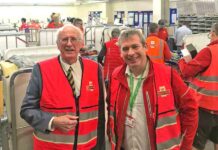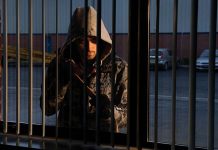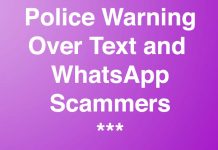Paws for Thought’ campaign aims to raise awareness around illegally bred dogs.
‘Paws for Thought’ before considering buying a puppy… that’s the message set out in a new campaign to raise awareness of what to look out for when buying a puppy.
The multi-agency campaign aims to raise awareness ahead of potentially increased demand for puppies coming up to Christmas. It is being supported by Newry Mourne and Down District Council, Her Majesty’s Revenue and Customs (HMRC), Police Service of Northern Ireland (PSNI), Department of Agriculture, Environment and Rural Affairs (DAERA), and Trading Standards.
PSNI Inspector Amanda Ford said: “Many people start their search for a new puppy online, and the campaign aims to raise awareness that buyers are more likely to buy an illegally bred puppy than they think.
“We are working in partnership to put a stop to illegal puppy farming, welfare concerns and serious organised crime within our District with our ‘Paws for Thought’ campaign.
“We want to raise awareness around what to look out for when buying a puppy. We know that irresponsible breeders, or sellers, can offer puppies for sale.
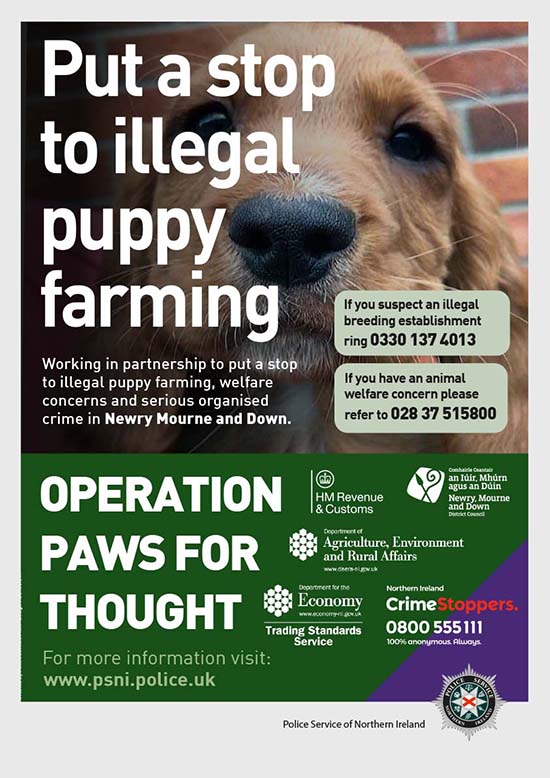
“These people may not have looked after the puppies properly, and may only be interested in making as much money as possible. This could mean that you end up buying a puppy that is very sick, or a puppy that has not been properly socialised.
“Buying puppies from illegal breeders can have devastating results. Often these puppies die a short time after purchase or end up with infectious diseases such as parvovirus which is expensive to treat and often fatal.
“They can also suffer behavioural issues relating to fear and anxiety due to poor or no socialisation. It can be tempting to buy a puppy in these circumstances and often purchasers recognise things are not quite right.
“It is normal to want to ‘rescue’ a puppy in these circumstances but people must remember they are fuelling and supporting what is a particularly lucrative criminal industry.”
Inspector Ford added: “Police powers in relation to dog breeding establishments are to offer breach of the peace and public safety support to partner agencies and to investigate where there are any possible links to serious organised crime and/or dog fighting offences.
“PSNI will also report any suspected breaches of the legislation to the council animal welfare officer or council Enforcement Officer.
“Local district councils enforce the legislation governing the licencing and inspection of breeding establishments. Police have powers under the Welfare of Animals Act (NI) 2011 to enforce the law in respect of fighting offences however if the public suspect there are any welfare concerns on the dogs this should be reported to the local council animal welfare officers.
“We would encourage anyone who is aware of illegal dog breeding establishments to contact their local council. For welfare concerns please report to the animal welfare officer in the local council.
“If there are suspicions in respect of serious organised crime with links to fighting offences please report to PSNI on 101 or Crimestoppers on 0800 555 111. Any reports received by our officers are referred through to the relevant agencies and if any criminality is detected, this will be investigated thoroughly by police and a joint multi-agency approach will be implemented when necessary.”
The Chairperson of Newry, Mourne and Down District Council, Councillor Laura Devlin, said: “I cannot emphasise strongly enough how important it is that anyone wishing to operate a dog breeding establishment in the Newry Mourne and Down area must first obtain a licence from the Council.
“This helps ensure that dog breeding establishments in the district operate to recognised standards, and provides reassurance to the public that their puppy is coming from a reputable establishment”.
A DAERA spokesperson said: “The Department supports the actions being taken by local Councils and the PSNI towards the prevention of illegal trading of dogs. We continue to work with partner agencies to identify such activity, especially with regard to the prevention of compromised standards of welfare when animals are being transported.”
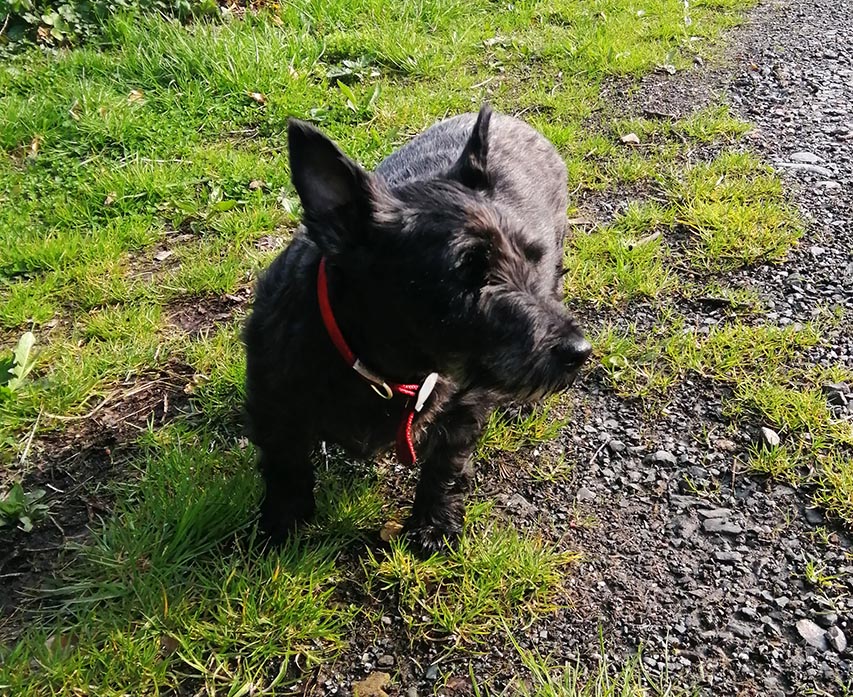
An HMRC spokesperson also commented: “The puppy trade is big business and our research suggests that this is a multi-million-pound industry where some unscrupulous individuals involved in both the breeding and selling of puppies are cheating the public purse and not paying the correct taxes. Puppies are basically being used as a commodity and fetch considerable sums of money on the illicit market.
“We know that most breeders are honest and operate above board, and these people have nothing to worry about – but those who cheat the tax system can expect to come under scrutiny from HMRC. Everyone should pay the tax they owe and dishonest businesses make it difficult for the honest majority to compete in the marketplace”
Alison Gilchrist from Trading Standards said: “Consumers should always check the authenticity of documents offered with the puppy prior to purchase. Often consumers are provided with false registration and vets vaccination certificates which can make the puppy appear more valuable and attractive to the consumer”
Things to look out for when buying a puppy:
* Buy a dog from a known breeder, and be cautious when buying a dog that has been advertised in the media, such as on the internet, in a local paper or on a notice board.
* Check the dog’s history by talking to its previous owner and asking to see relevant documents, including the dog’s vaccination certificate.
If you have any doubts about a dog you should speak to a vet before agreeing to buy it.
Also:
- When buying a puppy you should only buy a puppy aged at least eight weeks old the puppy with its mother
- Make sure the breeder/ seller can give you an official pedigree detailing the ancestry of the puppy’s father and mother
- Make sure the breeder/ seller can give you important details about the specific health needs of your puppy, such as which vaccinations it has been given and which ones it is yet to have
- If the puppy does not come from where it’s bought, ask where it came from and try to get its previous history as buying from an illegal breeder may mean that your new puppy was illegally imported into Northern Ireland
- Make sure the breeder has prepared the puppy for the world around it – this is called ‘socialisation’ and include activities like gently handling the puppy, introducing it to noise and varieties of human contact and mixing it with other puppies.
If you suspect an illegal breeding establishment ring 03301374013 and for a welfare concern, please ring 02837515800.



